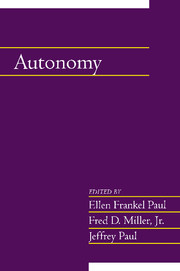Book contents
- Frontmatter
- Contents
- Introduction
- Acknowledgments
- Contributors
- Stoic Autonomy
- Autonomous Autonomy: Spinoza on Autonomy, Perfectionism, and Politics
- Kant on the Theory and Practice of Autonomy
- How Much Should We Value Autonomy?
- Autonomy, Duress, and Coercion
- Autonomy and Hierarchy
- Reason and Autonomy
- Identification, the Self, and Autonomy
- Some Tensions between Autonomy and Self-Governance
- Autonomy from the Viewpoint of Teleological Behaviorism
- The Paradox of Group Autonomy
- Abortion, Autonomy, and Control over One's Body
- Freedom as a Political Ideal
- Index
Stoic Autonomy
Published online by Cambridge University Press: 06 July 2010
- Frontmatter
- Contents
- Introduction
- Acknowledgments
- Contributors
- Stoic Autonomy
- Autonomous Autonomy: Spinoza on Autonomy, Perfectionism, and Politics
- Kant on the Theory and Practice of Autonomy
- How Much Should We Value Autonomy?
- Autonomy, Duress, and Coercion
- Autonomy and Hierarchy
- Reason and Autonomy
- Identification, the Self, and Autonomy
- Some Tensions between Autonomy and Self-Governance
- Autonomy from the Viewpoint of Teleological Behaviorism
- The Paradox of Group Autonomy
- Abortion, Autonomy, and Control over One's Body
- Freedom as a Political Ideal
- Index
Summary
INTRODUCTION
As it is currently understood, the notion of autonomy, both as something that belongs to human beings and human nature, as such, and also as the source or basis of morality (that is, duty), is bound up inextricably with the philosophy of Kant. The term “autonomy” itself derives from classical Greek, where (at least in surviving texts) it was applied primarily or even exclusively in a political context, to civic communities possessing independent legislative and self-governing authority. The term was taken up again in Renaissance and early modern times with similar political applications, but was applied also in ecclesiastical disputes about the independence of reformed churches from the former authority in religious matters of the church of the Roman popes. Kant's innovation consisted in conceiving of (finite) individual rational persons, as such, as lawgivers or legislators to themselves, and to all rational beings (or rather to all that are not perfect and holy wills), for their individual modes of behavior. For Kant, rational beings possess a power of legislating for themselves individually, according to which they each set their own personal ends and subject that selection, and their pursuit of the ends in question, to a universal principle, which is expressed in Kant's categorical imperative. The categorical imperative requires that one set one's own ends only within a framework that would warrant acceptance by all other such beings.
- Type
- Chapter
- Information
- Autonomy , pp. 1 - 29Publisher: Cambridge University PressPrint publication year: 2003
- 4
- Cited by

